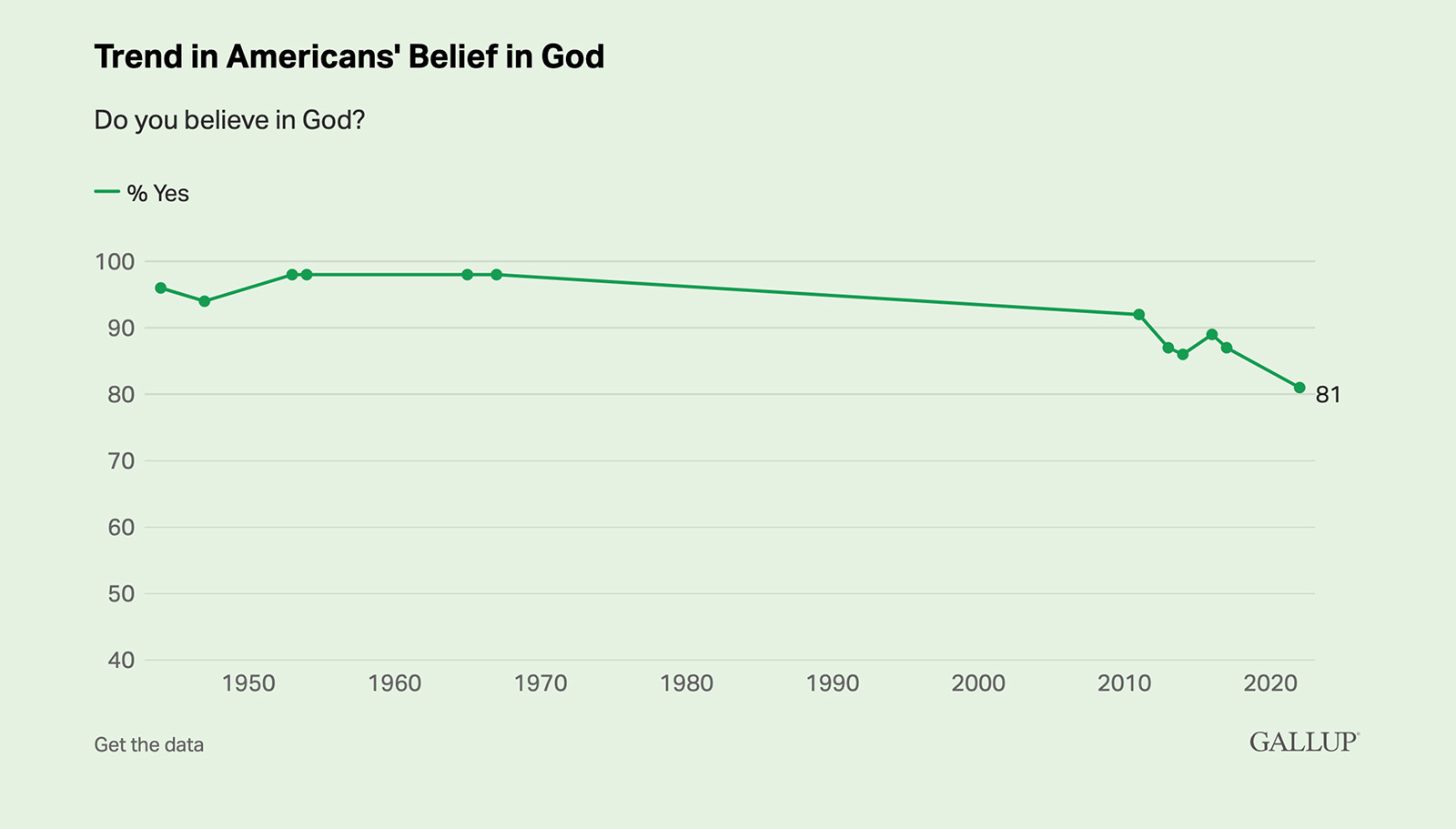See Poll: Americans’ belief in God is dropping by Yonat Shimron. Excerpts:
"In the latest Gallup Poll, belief in God dipped to 81%, down 6 percentage points from 2017, and the lowest since Gallup first asked the question in 1944."
"Throughout the post-World War II era, an overwhelming 98% of U.S. adults said they believed in God. That began to fall in 2011, when 92% of Americans said they believed in God and, in 2013, went down again to 87%."
"About 29% of Americans are religious “nones” — people who describe themselves as atheists, agnostics or “nothing in particular” when asked about their religious identity."
"belief in God has fallen most among younger Americans. Only 68% of adults ages 18-29 said they believed in God (compared with 87% of Americans age 65 or older.)"
"The poll found that 72% of self-identified Democrats said they believed in God, compared with 92% of Republicans (with independents in between at 81%)."

See Young Adults Tend to Stay Close to the Nest by Rina Torchinsky of The WSJ. Excerpts:
"80% of young adults at age 26 had moved less than 100 miles of where they grew up, and just 10% moved more than 500 miles away."
"Young adults raised in higher-income families moved farther than those who were raised in lower-income families, the paper shows."
"At age 26, Asians were living an average of around 220 miles from where they grew up; whites, 190 miles; Hispanics, 140 miles; and Blacks, 130 miles away"
"Researchers estimate that if wages in a given commuting zone increased by roughly $1,600 annually or about 80 cents per hour, 99% of the wage gains would reach residents who would have lived there anyway if there wasn’t a wage increase."
See Americans Are Breaking Up With Their Work Friends by Lindsay Ellis of The WSJ. Excerpts:
"The role of workplace friendships is now getting a big test, as companies seek to rebuild office cultures with many of their employees still remote part of the time. Among nearly 4,000 hybrid workers surveyed by Gallup in June, 17% said they had a “best friend” at work, down from 22% who said they did in 2019. For all workers, including those fully remote or on-site, the share who reported a close work friend slipped less, to 19% from 20%.
Meanwhile, the data suggests the link between having a best work friend and feeling committed to a job has grown stronger over the past three years—meaning, workers who don’t have one are more likely to want to leave. About 15% of people without a best friend at work reported being extremely satisfied at work this year, fewer than the 23% who said the same in 2019, according to Gallup, which has been surveying employees on their work friendships for more than two decades."
"The reliance on Zoom calls and other virtual forums at work has made cultivating and keeping up work friendships taxing for many people, said Julianna Pillemer, a professor at New York University’s Stern School of Business who has studied work relationships."
"Some employers are trying to help co-workers cultivate such bonds. This summer, KPMG brought its 2,800-person intern class to a lake house training facility in Orlando, Fla., complete with social venues, guest rooms and a gym. A spokesperson said the company hopes that the in-person socializing and networking will help many interns ultimately accept full-time job offers from the accounting firm."
See Life Expectancy in the U.S. Fell Again in 2021 as Covid, Overdoses Took Toll by Julie Wernau of The WSJ. Excerpts:
"Life expectancy in the U.S. dropped in 2021 for a second consecutive year as Covid-19 and overdoses drove up mortality rates, preliminary data showed.
Americans’ life expectancy last year fell 0.9 year on average to 76.1 years, according to data from the Centers for Disease Control and Prevention released Wednesday. It was a smaller drop than in 2020, when life expectancy decreased 1.8 years, the data showed, but the combined figures for the two years were the largest since the 1920s, the CDC said."
"The data demonstrated that some groups have been hit particularly hard by the pandemic as well as the opioid crisis, which claimed some 108,000 lives last year. Indigenous Americans had the biggest drop in life expectancy in 2021 at 1.9 years, the data showed, bringing their life expectancy to 65.2 years, down 6.6 years since 2019."
"Life expectancy declined less among Black people than white people in 2021, the data showed, reflecting in part the higher burden of deaths among some minority groups in the early phases of the pandemic. Black people in the U.S. had a life expectancy of 70.8 years last year, according to the CDC, compared with 76.4 years for white people.
“We continue to see disparities for people of color,” said Ada Stewart, a family physician with Cooperative Health in Columbia, S.C., and board chair of the American Academy of Family Physicians. “They did not fare well during the pandemic.”"

No comments:
Post a Comment